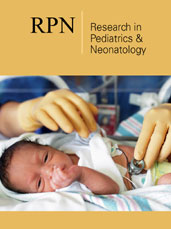- Submissions

Abstract
Research in Pediatrics & Neonatology
Effect of Parents’ Involvement Interventions in Speech Language Delay among Late Talking Toddlers in Egypt: A Quasi-Experimental Study
-
Open or CloseFarrag S1,2*, Afolabi MO3 and Rehab Abd El-Aziz El Sayed4
1Faculty of Nursing, Umm Al-Qura University, Saudi Arabia
2Faculty of Nursing, Mansoura University, Egypt
3Faculty of Infectious and Tropical Diseases, London School of Hygiene & Tropical Medicine, UK
4Faculty of Nursing, Mansoura University, Egypt
*Corresponding author: Farrag S, Faculty of Nursing, Umm Al-Qura University, Saudi Arabia
Submission: May 13, 2020; Published: June 19, 2020

ISSN : 2576-9200Volume4 Issue4
Abstract
Background: Speech language delay is a common developmental problem among Egyptian children. There is paucity of reliable data on parent involvement interventions in speech language problems and of communication disorders in Egypt.
Objective: We evaluated the effect of parent involvement in language development intervention programmes on a population of late talking toddlers recruited from local kindergarten schools in Alexandria, Egypt, using interaction-promoting strategies which encourage children to take turns in a conversation, ask questions and wait for a response.
Methods: Seventy-nine mother-child pairs were randomly assigned into an experimental group where a validated Language Development Survey (LDS) was administered while study mothers assigned to control arm had routine care according to kindergartens policy in Egypt. Pre-and post-intervention assessments were conducted on all domains of the tool.
Results: Approximately one third (30.9%) of the study children in the experimental group had severe language delay pre-intervention and this decreased to 16.2% of children post-intervention. On the other hand, less than one quarter (18.2%) of the study children in the control group had severe language delay pre-intervention, this increased to about half (54.5%) of children post-intervention (p=<0.043).This showed that significant expressive language gains can be made by pre-school language-delayed children, through group parental-based language intervention.
Conclusion: Findings of this study suggest that parent involvement had positive outcomes in terms of language development in their late-talking toddlers. The study supports the concept of parent involvement as a viable model of language intervention for promoting short-term developmental progress in latetalking toddlers.
Keywords: Speech Therapy; Paediatric; Nursing; Parent Involvement; Language Delay
 a Creative Commons Attribution 4.0 International License. Based on a work at www.crimsonpublishers.com.
Best viewed in
a Creative Commons Attribution 4.0 International License. Based on a work at www.crimsonpublishers.com.
Best viewed in 







.jpg)






























 Editorial Board Registrations
Editorial Board Registrations Submit your Article
Submit your Article Refer a Friend
Refer a Friend Advertise With Us
Advertise With Us
.jpg)






.jpg)














.bmp)
.jpg)
.png)
.jpg)










.jpg)






.png)

.png)



.png)






